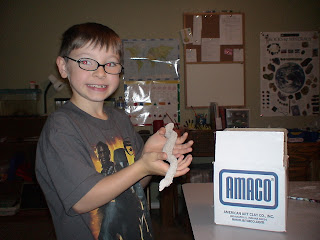Last month, Parents Magazine ran an article called "Why Art Makes Kids Smarter." Now, Parents Magazine is usually, to put it gently, full of crap about everything from parenting to education, but the article made a point that has been well known in education circles for years: artistic expression actually improves a child's grasp of "core" subjects like math, literacy, and science.
They described three schools, in Arizona, California, and New York who actually improved their test scores by adding more art classes to their curriculum, as well as incorporating it into other subjects. This is counter to the popular tactic of cutting art funding to accomplish the same goals (hint: it doesn't, and never will, work). The Regio Emelia schools in Italy have been doing this for years with great success, while the U.S. has been viciously cutting funding for art class, shop class, band, and any other subject that doesn't rate a section on the standardized test.
I've been beating this drum since Rich was in kindergarten, not because I gave a rip how he did on standardized tests, but because when implemented consistently, art in its many forms gives birth to skills that are not obtained from "the three R's" - it teaches the use of metaphor, imaginative thinking, three dimensional problem solving, structure and form, engineering conceptualization...I could go on an on (can you tell?)
I was pulled out of third grade math for a special art class, therefore missing key math concepts which haunt me to this day. The intention was good, but the methodology was flawed. I hate math, but if you use art to teach me math - Bingo! But we have such a faulty, compartmentalized view of education that we're still trying to separate the fine arts from other disciplines, instead of blending them in. And the Renaissance chuckles at us and clicks it's tongue from the annals of history.
I think kids are like this about pretty much all subjects. Art turns the learning over to the child because it is by nature subjective. They can approach creating something in whichever way seems best to them, and it doesn't matter if they get it right. It allows them to fail (Yes, the "F" word that's feared and dreaded in public education, despite the fact that brilliant minds from DaVinci to Einstein cite it as the key to success. Hey, it's not the teachers' fault. They're not the ones who insisted that No Child be Left Behind - or rather that No Textbook or Testing Company Be Left Unpaid. But I digress...). The good news, and hopefully a nail in the coffin of the NCLB Act, is that the current administration has launched an extensive assessment of the state of art education in the U.S. for these very reasons. The survey results won't be in until 2011, but at least there's finally an acknowledgment that the Draconian NCLB Act needs to be replaced with something positive and holistic, and that the Arts should play a key role.
Most objections to this approach come from well meaning people who often insist we must return to "the basics" of education ("the three R's") and do away with such frivolous subjects as design, drawing, dance, Latin, music and other disciplines of a classical education. I argue that if we're going to train kids to be architects, graphic designers, software engineers, biochemists, or nuclear physicists, they need the imaginative, creative skills that are only afforded when education is approached with imagination and creativity. They need art. Traditional public education is designed to train people to work in factories, which is fine if that's what you love to do, but that outdated system is a product of the industrial age, not the post-tech age that is upon us. The long view of education must have art at its core, even if the child is not "artistically inclined" (and honestly, have you ever known a kid that wasn't? Public education sometimes beats it out of them). Rich was fortunate enough to have an awesome Kindergarden teacher for constantly engaged the kids in art projects, but as he moved up, art was gradually phased out until he only got it in a "specials" class one hour a week. It's not about them learning how to paint beautifully or sight read Mozart's Concerto in B. It's about them developing, through artistic means, the skill set that will make them a better scientist, mathematician, writer, or athlete.
Sermon over. Go draw something. :)




nu=4459)642)258)WSNRCG=32+9%3B7%28776335nu0mrj.jpeg)
nu=4459)642)258)WSNRCG=32+9%3B7%28993335nu0mrj.jpeg)
nu=4459)642)258)WSNRCG=32+9%3B7%2898+335nu0mrj.jpeg)




















